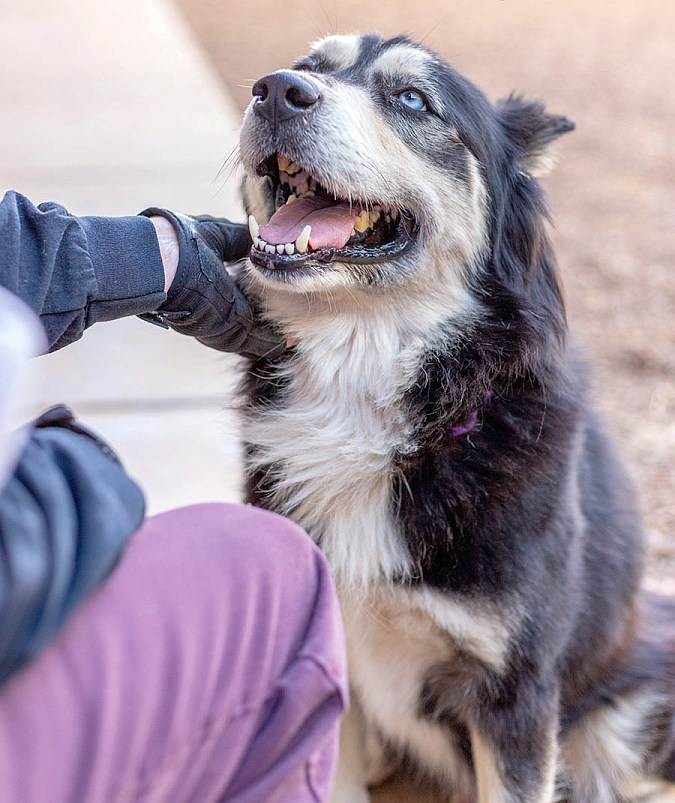Story & photos by Kristy Meyers
“You’re PAWsitively amazing!”
“You’re so fetching, Valentine!”
“I’m barking mad for you!”
“I’ll love you FURever!”
“I WOOF you!”
If you’re like me, you have received a card with at least one of these witty sayings. There has been an increasing demand for dog puns on Valentine cards in the last few years, and with good reason. With equally increasing dog ownership across the country, it is clear that our hearts belong to our furry family members. And as research shows, their hearts belong to us as well.
Animal behavior is an expanding field of investigation as countless labs around the world have engaged in studies to determine what genetics, biology, and neuroscience each reveal about dogs and affection.
For years, studies have shown that dogs have an exceptional level of cognition and social intelligence gained after centuries of domestication. However, recent studies have indicated a deeper emotional intelligence in our dogs as well. According to these studies, dogs have not only evolved to simply get more treats, but to form deep bonds with their beloved humans.
My Penny girl certainly has the most expressive eyebrows, which earns her both treats and affection in our household. As I am learning from the data, there is more to this than I assumed.

In the last decade, the topic of love in dogs has been a focus for many, including prominent researchers and authors such as Clive Wynne, psychologist and founder of the Canine Science Collaboratory at our very own Arizona State University. His book, Dog Is Love: Why and How Your Dog Loves You, evaluates the brain scans of dogs and the greater field of behavioral psychology to tell us more about man’s best friend.
According to his findings, the reward center in dogs’ brains lights up significantly with both the signal for treats coming and their humans coming, if not more so with the signal for their human. Similarly, Wynne told NPR that chemicals such as oxytocin spiked in both humans and dogs when they looked lovingly into each other’s eyes (NPR, 2019).
This hormone is the same neurotransmitter involved in childbirth, released during long hugs, and heightened in relationships between loved ones. Oxytocin is associated with empathy and trust, just as we experience in our daily interactions with our beloved dogs.
This research indicates that our dogs are not just excited to see us because we feed them, walk them, and play with them, but because they sincerely feel affection. The “love hormone” of oxytocin as well as other important chemicals is equally present in their brain as in ours during our times together.
Wynne also recounts a phenomenon to the Washington Post in which people repeatedly reported dogs attempting to rescue their owners from bombed buildings and other wreckage during WWII (Washington Post, 2019). Similar accounts have turned up across anthropological reports during our times with dogs.
It’s no wonder there is an increasing demand for service dogs and emotional support animals alike. He and his team conducted experiments with volunteers crying out in distress and have been astounded that dogs frequently show signs of being upset by these calls and even attempt to rescue their companions from boxes throughout trials (Washington Post, 2019).
It is not just television specials like Lassie that show this phenomenon to be true. Just as many of us would do anything for our dogs, it seems they are equally committed to us as well.
If research shows us anything, it’s certainly the fact that our furry family members are PAWsitively amazing! Perhaps I need to remember this when it seems like my dog cares more about the treats I am giving her than my love, for it seems she cares about my affection and my well-being after all.
Most importantly, Wynne leaves us with a call to action this Valentine’s Day, as well as one for every day. He states, “You know your dog needs feeding. Most recognize that dogs need exercise. The thing that upsets me is that people don’t give enough thought to the fact that a large part of what makes it so wonderful to live with a dog is your dog’s social nature.” (Washington Post, 2019).

So as we celebrate Valentine’s Day, as the spring sunshine starts to bring warmer afternoons, we should all plan to spend a little more time with our special little valentines. We must make a point to enjoy the bonds between us and our sweet dogs, and if research proves anything, we can certainly recognize their sincerity in their signs of affection.
I can tell you without a doubt that my pup and I really will love one another FURever. Don’t you feel the same?
Sources
Sofia, M. (NPR). (2019, December 2). “Shortwave” [Audio podcast]. Retrieved from https://www.npr.org/2019/10/21/771847058/does-your-dog-really-love-you
Brulliard, K. (2019, September 25). “What makes dogs so special and successful? Love.” Washington Post. https://www.washingtonpost.com/science/2019/09/25/what-makes-dogs-so-special-successful-love/
Kristy Meyers is the owner and photographer for Penny Lane Photography. Visit her at pennylanephotographyaz.com.

